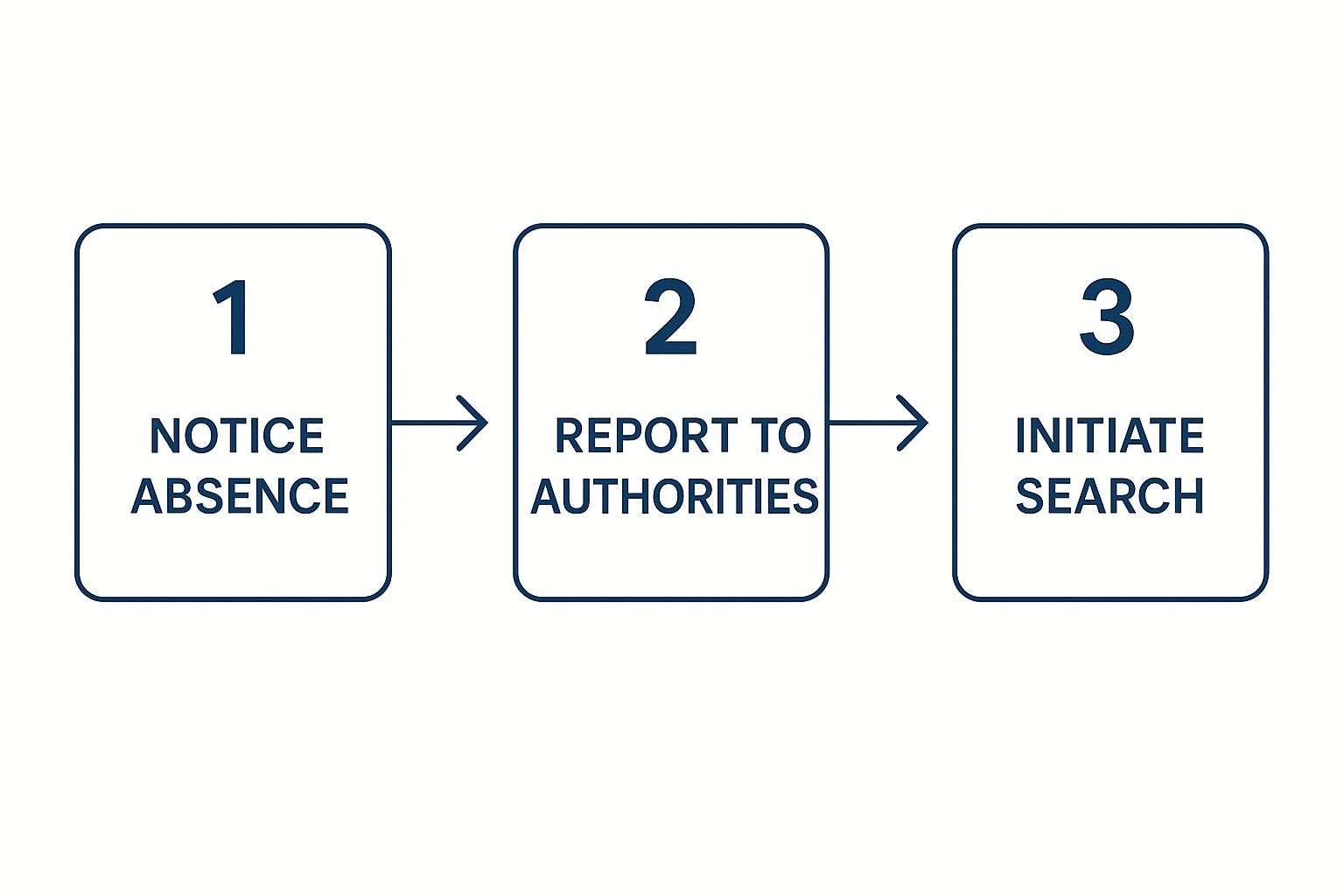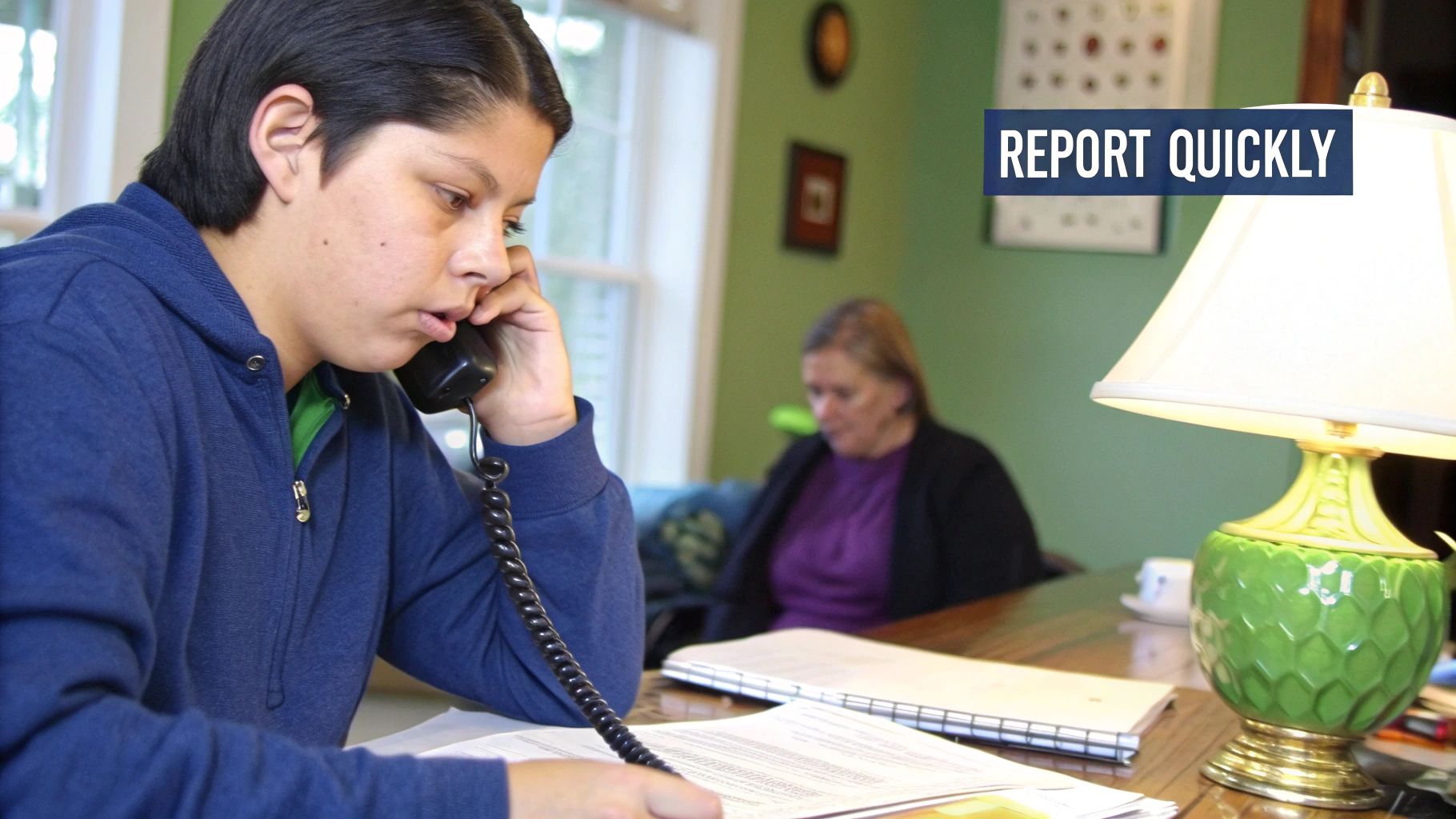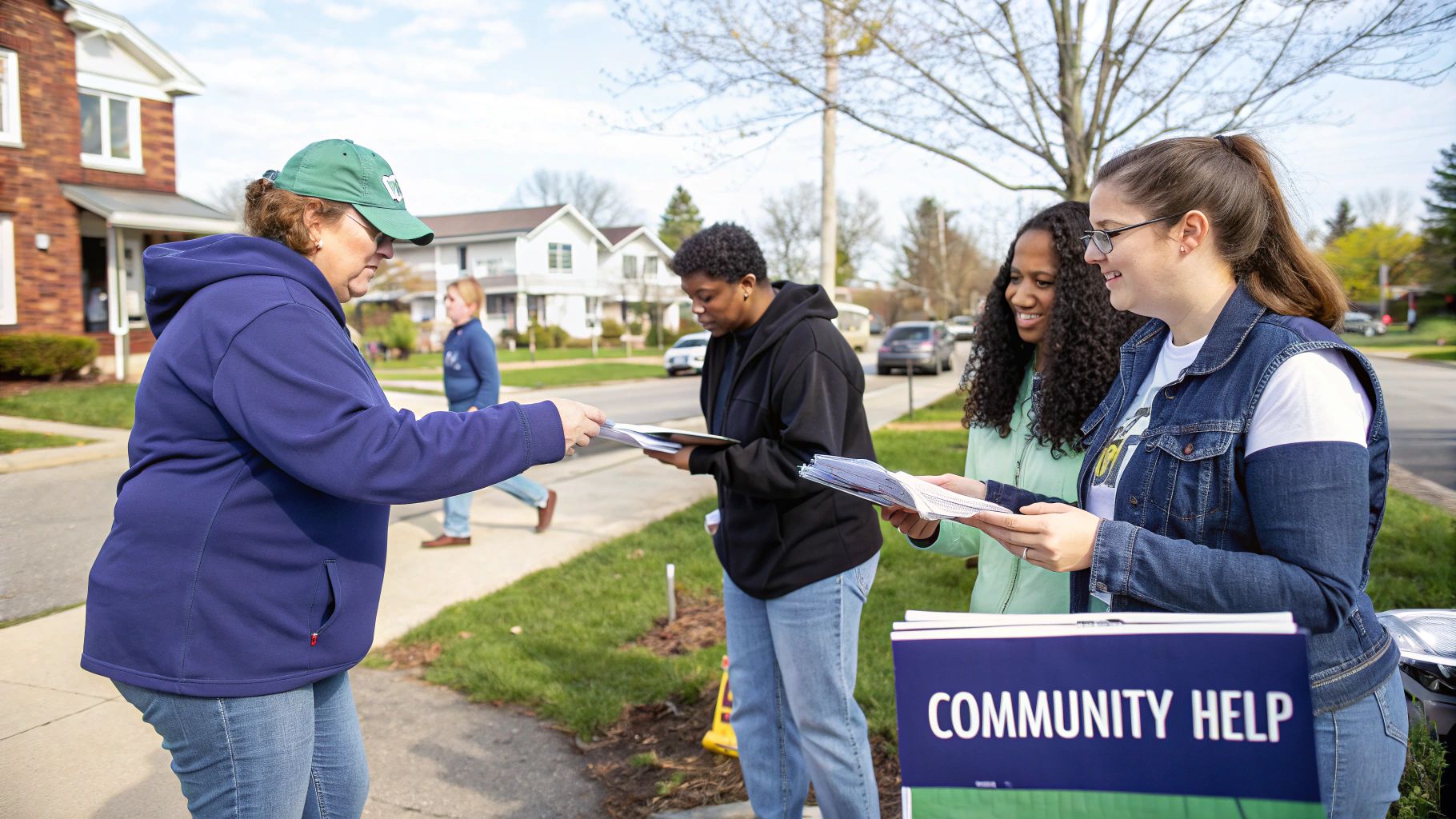How to Find Someone Missing A UK Guide
- Showix technical Team
- Jul 23, 2025
- 17 min read
Updated: Jul 26, 2025
When you realise someone is missing, your mind races. It's a gut-wrenching moment filled with panic and a hundred "what ifs." But what you do right now, in these first few hours, can make all the difference. The key is to take a deep breath and turn that fear into focused, methodical action.
You need to become the anchor in the storm, gathering information and coordinating the first steps of the search. It's not about finding them in the next five minutes, but about laying a solid groundwork for the professionals who will soon join the effort.
The First Crucial Hours: What To Do Immediately
That initial wave of panic is overwhelming. It’s a feeling that can freeze you in place or send you running in circles. From my experience, the most important thing is to channel that adrenaline into a clear, logical plan. You're about to become an information hub, a point of contact, and a coordinator, all while dealing with immense stress.
Every small detail you gather, every person you call, helps build a clearer picture. Let's walk through how to organise your thoughts and actions from the very beginning.
Organise Your Initial Actions
Before you start dialling, pause. First, you need to be certain the person is actually missing and not just unreachable or running late. Quickly check the obvious places they might be – their room, the garden, a neighbour's house, or a favourite local spot.
At the same time, grab a notebook or open a document on your computer. This will be your logbook. Write down every single thing you do: who you call, what they say, the time of the call, and any information you learn. This simple log will be your best friend, stopping you from repeating yourself and making sure no detail gets forgotten in the chaos.
Key Takeaway: In the initial chaos, a simple logbook is your most powerful tool. Documenting your actions from the very beginning provides clarity and ensures crucial information is preserved for when you report the person missing.
Gather Essential Information
Your next job is to pull together a file of vital details. This isn't just for you; this is exactly what the police will ask for when you file a report. Having it ready to go makes the official process much faster and more effective.
Here’s what you need to collect:
A recent, clear photograph that shows their face well.
A detailed physical description: Include their height, weight, hair and eye colour, and any distinguishing marks like scars, birthmarks, or tattoos.
The clothes they were last seen wearing. Be as specific as you possibly can.
Details about their mobile phone and any other devices they might have.
Information on their vehicle, if they have one: make, model, colour, and registration number.
This information forms the bedrock of the investigation. The faster you can provide it, the better the head start for the search teams.
Immediate Action Checklist
To help you focus, here’s a quick summary of the first essential steps. This checklist helps you systematically cover the basics before involving the authorities.
Action Item | Why It's Important | Details to Collect |
|---|---|---|
Check Immediate Surroundings | Confirms the person is not simply nearby or delayed. | Search their home, car, and frequent local spots. |
Contact Close Circle | Rules out simple miscommunications or changes of plan. | Call or message their closest friends, family, and partner. |
Compile Vital Stats | Prepares you for filing an official police report. | Photo, physical description, last-seen clothing, vehicle details. |
Start a Logbook | Keeps track of actions and information to avoid confusion. | Note down times, names, and key facts from every call. |
Create a Timeline | Narrows down the critical time window for the search. | Last confirmed contact, last known location, intended plans. |
Completing these actions provides a solid, organised foundation for the authorities to build upon once you report the person missing.
This flowchart gives a clear visual of how these initial steps flow into the official reporting process.

As you can see, reporting to the police is the pivotal moment where your personal concern becomes an official investigation.
Create a Timeline of Events
Now, let's piece together their last known movements. You need to work backwards from the moment you realised they were gone. Call friends, family, and colleagues to pinpoint the last time anyone saw or spoke to them.
Try to build a simple timeline:
Last Confirmed Contact: What was the date, time, and how was it made (a call, text, or in-person chat)?
Last Known Location: Where were they physically seen or known to be?
Intended Plans: Did they say where they were going or what their plans were for the day?
This timeline is incredibly valuable. It helps the police identify the critical window when the person disappeared and focuses the search on a specific time and geographical area. In the UK, more than 170,000 people are reported missing each year—that’s roughly one person every 90 seconds. The good news is that most are found safe and well, with 76% of adults found within 24 hours. But for every single case, those first actions you take are vital. You can learn more about this issue by exploring data and campaigns from Missing People, a charity dedicated to supporting this cause.
Reporting a Missing Person to the Police
Once you've managed to gather your thoughts and the basic facts, the next step isn't just important—it's essential. You need to contact the police. This action officially kicks off the investigation and brings in trained professionals who know what to do. I know it can feel like a huge, intimidating step, but it’s the most critical one you’ll take.
A lot of people hesitate here. They worry they might be overreacting or wasting police time. There's a persistent myth that you have to wait 24 hours before you can report someone missing. This is completely false and incredibly dangerous advice. UK police forces stress that you should call as soon as you genuinely believe someone is at risk. There is no waiting period. Trust your gut—if it tells you something is wrong, make the call.
How to Make the Report
You’ve got two main ways to report a missing person. The most common is to call 101, the non-emergency police number. This is the right choice if you don’t believe the person is in immediate, life-threatening danger.
However, if you think the person is at serious risk of harm, or if they are particularly vulnerable—like a young child or someone with dementia—you must call 999 straight away. Don't second-guess this.
You can also go directly to your local police station to file the report in person. Sometimes, speaking with an officer face-to-face is reassuring, and it allows you to hand over things like photos on the spot. Whichever route you choose, the questions you'll be asked will be very similar.

Crucial Tip: When you make the report, always ask for a police case reference number. Write this down in your logbook immediately. This number is your lifeline for all future communications about the case. It’s how you’ll get updates and provide new information without having to start from scratch every time you call.
What Information the Police Will Need
Having your information ready beforehand makes a world of difference. It helps the reporting process go much more smoothly and gives the police a stronger starting point. The officer will guide you, of course, but your preparation helps them quickly assess the level of risk.
Be prepared to share these details:
The Basics: Their full name, date of birth, and a good physical description—height, build, hair and eye colour.
Identifying Features: Things like tattoos, scars, birthmarks, or piercings are incredibly useful for identification.
The Last Sighting: What were they wearing? Where and when were they last seen, and who were they with? Be as precise as you can.
Medical Needs: Mention any physical or mental health conditions, especially if they need medication. This is vital for the police risk assessment.
Habits and Connections: Their mobile number, daily routines, favourite pubs or parks, and the contact details of their close friends.
This information isn't just a checklist; it helps the police build a picture of the person and their vulnerabilities, which directly impacts how they classify the case and the resources they assign to it. If you're looking for more in-depth advice on these steps, our guide on how to trace someone in the UK the right way is a valuable read.
What Happens Next?
After you've filed the report, the police will carry out a risk assessment. They'll classify the case as low, medium, or high risk, which determines the urgency and scale of their response. A high-risk case, like a missing child, will trigger an immediate and massive mobilisation of resources.
Don't be surprised if the police want to visit the person's home. They’ll be looking for clues like a note left behind, travel plans, or recent computer activity. In more serious cases, you'll be assigned a Police Liaison Officer. This officer becomes your dedicated point of contact, keeping you updated and offering support. Remember, the police are your partners in this. The information you provide is their most powerful tool.
Using Social Media to Amplify Your Search
When someone you love goes missing, social media can feel like a double-edged sword. On one hand, it’s an incredibly powerful tool for spreading the word and gathering potential leads. On the other, a disorganised approach can quickly devolve into a mess of misinformation, hurtful speculation, and privacy issues. The secret is to approach it with a clear, calm strategy.
Your main goal isn't just to post frantically; it's to create a single, authoritative source of information that everyone can share. This one post will become the central hub for your entire online search, so getting it right from the very beginning is absolutely vital. Think of it as the digital equivalent of a missing person poster, but one that can travel much further and faster.

Crafting the Perfect Shareable Post
Before you even think about typing, choose one person to be the designated point of contact for social media. This is so important. It stops conflicting updates from confusing people and gives everyone a single person to turn to. This individual will create the one main post that everyone else will be asked to share.
Here’s exactly what needs to go into that initial post:
A recent, high-quality photo: It has to be a clear head-and-shoulders shot where their face is easily seen. Steer clear of group photos, blurry images, or pictures where they’re wearing sunglasses or a hat.
Essential facts only: Only share information that has been approved by the police. This will usually be their name, age, height, a brief description of what they look like, and the clothes they were last seen wearing.
Location, date, and time: Be specific. Clearly state the town or city, and the date and time they were last seen. This context is critical for jogging someone's memory.
Official contact information: Never put your personal phone number on the post. All tips and information should be directed to the police. Include the official case reference number and the 101 contact number. This ensures every piece of information is properly logged and followed up by the authorities.
Once that post is live, your instruction to friends and family should be simple and direct: "Please share this original post, do not copy and paste." This is crucial because if you need to add an update or make a correction, everyone who shared the original will see the latest version. It prevents old, inaccurate details from circulating.
Choosing the Right Platforms
Trying to be on every single social media platform isn't the best use of your energy. It's far more effective to focus on the platforms where you're most likely to reach the right people. Think local.
Facebook is often the best place to start. It’s still one of the most powerful tools for searches at a community level. Make sure you post in relevant local groups, like:
Community noticeboards for the specific town or neighbourhood.
Local buying and selling groups (they have huge memberships).
Hobby groups related to the person’s interests—for example, local hiking clubs, car enthusiast pages, or a book club group.
Beyond Facebook, think about the missing person's life. Were they a career-focused individual? LinkedIn might be helpful. Were they younger? Their friends are probably most active on Instagram or even TikTok. For a more in-depth look at this, you might find this a complete guide to tracking social media mentions useful.
A Note on Privacy: To get the widest possible reach, the post must be public. You’ll need to go into your privacy settings for that specific post and change the audience to "Everyone." I know this can feel uncomfortable when you’re worried about a loved one, but it’s a necessary step to get their face and the facts out there.
Managing the Information and the Noise
It's an unfortunate reality, but a public appeal will attract speculation and, sometimes, cruel or unhelpful comments. You must not get drawn into arguments or engage with theories from strangers. The job of the designated social media person is to filter out this noise.
Your only role online is to share official updates from the police and to thank the community for their help and support. Let law enforcement handle the investigation. If someone sends you a tip via a private message, thank them politely and immediately pass that information to the police, quoting your case reference number. Do not try to investigate it yourself. Your focus has to be on supporting the official search and looking after your family, not chasing down unqualified leads.
Working with UK Charities and Support Groups
When someone you love goes missing, the sense of isolation can be overwhelming. You don’t have to carry that weight by yourself. While the police are handling the official side of things, there’s a whole network of UK charities and support groups ready to step in. They offer both practical help and, just as importantly, a shoulder to lean on.
Think of them as a vital part of your team. They have the experience and the networks to spread the word in ways a single family simply can't. Registering the missing person with them is a powerful step towards getting more eyes and ears involved in the search.
Key Organisations and What They Do
The main charity you'll want to connect with in the UK is Missing People. Their helpline, 116 000, is free, confidential, and open 24/7. It's not just for reporting someone missing; it's a lifeline for families who need advice and support from people who truly get it.
They offer a huge range of help, all designed to support you through this difficult time:
Publicity Appeals: They create and share missing person posters across their network, which includes everything from digital billboards to media outlets.
Family Support: You can get one-to-one support, counselling, and be connected with other families who are going through the same thing. Sometimes, just talking to someone who knows what it's like is a massive relief.
TextSafe® Service: This is a clever service that lets them send a discreet text to the missing person's phone. It gives your loved one a safe, confidential way to reach out.
Another fantastic resource is The Lucie Blackman Trust. They are experts in helping families when a British citizen goes missing overseas, but their crisis management support is also available for cases here in the UK. When you’re feeling completely lost, their guidance can be invaluable.
Emotional and Practical Help When You Need It Most
Let's be honest, the emotional strain of searching for someone is immense. The endless worry and uncertainty can wear you down, making it hard to think straight. This is where the support groups really shine. They give you a safe, judgement-free space to talk with people who understand what you’re facing.
A Crucial Lifeline: The emotional support from charities like Missing People is not a secondary benefit—it is a core part of sustaining a long-term search. Looking after your own mental health is essential to remain effective and resilient throughout this incredibly difficult process.
These groups also provide practical advice that comes from years of experience. They can help you navigate media attention, understand what's happening with the police investigation, and even deal with the fiddly admin problems that pop up when someone is missing. Their expertise helps you make clear decisions when you're under an incredible amount of pressure.
Working Alongside a Private Investigator
Sometimes, as a case drags on and the police have to scale back their resources, families think about hiring a private investigator. Charities and private investigators can work together, but they do different jobs. The charity will focus on public appeals and supporting you, while the investigator gets on with dedicated, hands-on searching and digging for information.
If you’re thinking about this, understanding the role of a private investigator is a really important first step. It’s about letting the private firm do the investigative groundwork while the charity focuses on your family’s wellbeing.
Bringing these organisations on board doesn't mean you've lost faith in the police. It’s about building the strongest possible team. When you combine the official power of law enforcement with the public reach and compassionate support of these charities, you’re giving everyone the best chance of finding your loved one.
Adapting Your Search for Vulnerable People

No two missing person cases are ever the same. The way you’d look for a teenager who hasn't come home is completely different from how you’d search for an elderly relative with dementia or a loved one in the grip of a mental health crisis. These vulnerabilities aren’t just details; they are the very heart of the search strategy.
When you make that first, crucial call to the police, explaining these specific vulnerabilities is everything. It directly shapes their risk assessment, which dictates the level of resources and the urgency they assign to the case. A missing adult is always a serious concern, but a missing adult with a known heart condition who has missed vital medication is a high-priority emergency. Your information helps them see the complete, critical picture.
When a Child Goes Missing
The disappearance of a child is every family's worst nightmare, and it triggers a unique and urgent response from everyone involved. While your first instinct might be to panic, the best thing you can do is channel that adrenaline into a focused, methodical search.
Today's children live their lives both online and offline, so your investigation must cover both realms. Beyond the obvious checks with their school and their friends' parents, you need to think digitally. If you have access, check their recent activity on social media, gaming consoles, and messaging apps. Look for any unusual conversations or new online contacts they might have mentioned. This isn't about invading their privacy; it's about finding vital clues that could lead you to them.
The scale of this issue is immense. To give you an idea, in the 2022/2023 period, the West Midlands police area alone recorded 10,899 missing incidents involving children under 18. These incidents concerned 3,940 individual children, which tells us that some children are vulnerable to going missing multiple times. You can see more about these regional statistics and the challenges police face on theyworkforyou.com.
Supporting an Elderly Person with Dementia or Alzheimer's
When an elderly person with a cognitive impairment like dementia or Alzheimer's goes missing, the search plan shifts. In these situations, we're often looking at predictable patterns, not random wandering.
Individuals with dementia are often trying to get back to a place that feels safe and familiar from their past—a childhood home, an old workplace, or a neighbourhood they once loved. This is sometimes called "past-determined wandering." They aren't necessarily running from something; they're often on a mission to somewhere that makes perfect sense inside their own reality.
Focus your immediate search on these key areas:
Past Residences and Workplaces: Places they may be trying to "go home" to.
Familiar Routes: A walk they used to take daily or a path to a local shop.
Comfort Spots: A favourite park bench, a local church, or a community centre.
Outbuildings: Check sheds, garages, and other shelters where they might have sought refuge.
It's absolutely vital to speak with their care home or any carers. They will have detailed records of the person's routines, condition, and any previous wandering incidents, which can provide invaluable clues for the search teams.
Expert Insight: Someone with dementia might not respond if you call their name. Due to confusion or fear, they might even hide from searchers. This means teams have to be incredibly thorough, sweeping the same area several times.
Addressing Mental Health Crises
If you believe someone has disappeared because of a mental health crisis, like severe depression or psychosis, your approach must be handled with great sensitivity. Your role is to give the police as much context as you can so they can respond with the right training and a compassionate mindset.
Tell them about any recent changes in behaviour, expressions of hopelessness, or known triggers. This context is critical because it helps them understand the person may be in deep distress and might not want to be found. They could be seeking solitude in a place that feels safe to them, whether that's a quiet spot in nature or a secluded urban corner.
In these complex cases, you might feel the need for extra support alongside the police investigation. It can be helpful to review a detailed people tracing guide that covers different methods and legal tips to understand what other options are available.
Different vulnerabilities demand different search strategies. The table below outlines some key considerations for various groups.
Search Considerations for Vulnerable Groups
Vulnerable Group | Primary Focus Areas | Key Contacts |
|---|---|---|
Child/Teenager | School, friends' houses, social media, online gaming platforms, local hangouts. | School staff, parents of friends, online contacts (if known). |
Elderly with Dementia | Past homes/workplaces, familiar routes, local parks, churches, outbuildings. | Care home staff, GP, neighbours, family members familiar with their history. |
Person in Mental Health Crisis | Secluded spots (parks, woodlands), places of personal significance, transport hubs. | GP, therapist/counsellor, mental health support workers, close friends. |
Understanding these distinctions is key. Ultimately, tailoring your search means trying to step into their shoes, understanding their unique world, and sharing that crucial perspective with the professionals who are working to bring them home safely.
Common Questions About Finding a Missing Person
When someone you care about goes missing, your mind races with a thousand questions. It's a deeply unsettling time, and the not-knowing can feel like the worst part. Getting clear answers to your most urgent questions helps cut through the panic, allowing you to focus on what matters most: bringing them home.
Having the right information is empowering. It gives you a sense of purpose and helps you work more effectively with the police and other support networks. Let's tackle some of the questions we hear most often.
Do I Have to Wait 24 Hours Before Reporting Someone Missing?
This is one of the most persistent and dangerous myths out there, likely fuelled by old TV shows. The answer is a clear and simple no. You do not need to wait 24 hours to report someone missing in the UK.
Police procedure is not based on a ticking clock. It's based on concern. If you genuinely fear for someone’s safety and well-being, you should contact the police immediately. Early action is absolutely crucial, especially when the missing person is a child, an elderly individual, or someone with a known vulnerability. Always trust your gut instinct – if something feels wrong, make the call.
What Information Should I Have Ready for the Police?
When you first speak to the police, they'll need a lot of information to start their investigation. Being prepared can make a huge difference in those critical first hours, helping them build an accurate picture of the situation.
Try to gather these details before you call:
A recent, clear photograph where their face is easily visible.
A full physical description: think height, build, hair and eye colour, and any distinguishing features like scars, birthmarks, or tattoos.
The clothes they were last seen in – be as specific as you possibly can.
Their last known location and the time they were last seen or heard from.
Details of any vehicle they drive or have access to, including the make, model, colour, and registration number.
It's also vital to mention any medical conditions or mental health issues, especially if they rely on medication.
A Note From Experience: Having this information organised isn't just about saving time. It directly shapes the police's risk assessment, which in turn determines the level of urgency and the resources they allocate to the search. A well-prepared report can elevate the response from the very beginning.
Should I Hire a Private Investigator?
Hiring a private investigator is a path many families consider, and for good reason. This is especially true in longer-term cases where official police resources may have been scaled back. A good PI can dedicate focused, continuous time to your case, following up on leads that the police might not have the capacity to pursue.
It’s important to see them as a supplement to the official investigation, not a replacement. Private investigators don't have police powers or the same access to restricted information. They bring a different skill set to the table. If you decide to go this route, it's crucial to maintain full cooperation with the police. This creates a two-pronged approach, which can significantly improve the chances of a positive outcome.
How Do I Look After My Own Mental Health?
The emotional toll of searching for a missing loved one is immense. It’s a marathon, not a sprint, and looking after yourself isn't selfish—it's essential. You need to stay strong for yourself, your family, and for the person you're trying to find.
Here are a few things that can help:
Let people help. When friends and family offer to cook a meal or do the shopping, say yes.
Delegate tasks. You don't have to do it all. Put someone in charge of social media updates or fielding calls from extended family.
Talk to someone. Organisations like Missing People offer free, confidential support from people who truly understand what you're going through.
Try to maintain some routine. Even small things, like making sure you eat and get some sleep, can anchor you during a chaotic time.
Remember, you can't pour from an empty cup. Tending to your own well-being gives you the resilience needed for the road ahead.
When a case grows cold or police resources become stretched, you might need a dedicated team to keep the search going. The professionals at Sentry Private Investigators Ltd offer discreet people tracing and investigative services, giving your case the focused attention it deserves. Find out how we can help.





Comments